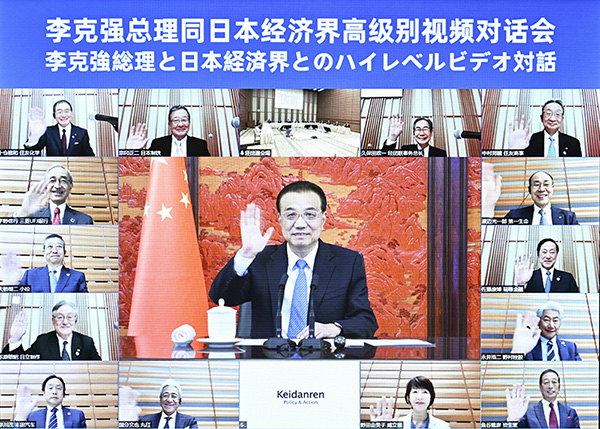BEIJING — Premier Li Keqiang said China is ready to work with Japan to upgrade the all-around, wide-ranging and multi-level cooperation, noting that China welcomes the Japanese business community to continue seizing development opportunities and actively expand its presence in the Chinese market to achieve win-win results.
Premier Li made the remarks on Sept 22 during a high-level video dialogue with representatives of the Japanese business community. He exchanged views with the representatives on a wide range of topics, including China-Japan relations, economic and trade cooperation, global economic and financial challenges, climate change, and aging populations.
Noting that China and Japan will mark the 50th anniversary of their normalization of diplomatic relations in a few days, Premier Li said China and Japan are important neighbors and the world's second and third-largest economies, respectively. Maintaining the sound and steady development of bilateral ties serves the interests of both sides, promotes the well-being of the two peoples, and safeguards the peace, stability and development of the region and the world.
Over the past 50 years, China-Japan relations have made great progress overall. The two sides should strive for peaceful and friendly coexistence, abide by the principles set out in the four political documents between the two countries, view each other's development in an objective and rational way, and push for the steady and long-term development of China-Japan relations, Premier Li said.

China and Japan have complementary economic advantages, and their cooperation shows great resilience and potential, Premier Li said. China is ready to work with Japan to upgrade the all-around, wide-ranging and multi-level cooperation, and make good use of the Regional Comprehensive Economic Partnership (RCEP) to tap regional economic growth potential.
"China will increase direct flights between China and Japan in an orderly manner to further facilitate personnel exchanges on the premise of COVID-19 prevention and control," the Premier said.
He said China is firmly committed to peaceful development, calling on the two countries to respect each other, treat each other as equals, enhance mutual trust, handle differences properly, jointly maintain a peaceful external environment and stable regional environment, and realize the common development of China, Japan and other countries in the region.
Premier Li noted that this year, the downward pressure on the Chinese economy has increased due to the impacts of factors that exceeded expectations. China has responded decisively, made timely adjustments, and worked to stabilize employment and prices. The Chinese economy has continued to run within an appropriate range and is showing an overall recovery trend.
Premier Li stressed that China will take a realistic approach and do its best to work toward reasonable results in economic development for the whole year. China remains committed to the basic state policy of opening-up and will only open its doors wider to the outside world.
China will continue deepening reform to delegate power, streamline administrative procedures and optimize government services, Premier Li said. It will also create a market-oriented and law-based international business environment, and ensure regulations are transparent, stable and predictable, he said.
China will also relax market access further and ensure intellectual property rights are protected strictly, Premier Li added.
"We hope the Japanese business community will continue seizing China's development opportunities, actively expand its presence in the Chinese market, strengthen cooperation with Chinese partners, and achieve more mutual benefits and win-win results," Premier Li said.
Representatives of the Japanese business community said that Japan and China are very important cooperative partners. The Japanese business community is optimistic about the prospects of China's economic development, and said it will actively expand its business in the country and strive to build Japan-China economic relations that meet the requirements of the new era.
The representatives also expressed hope that the two countries would take the opportunity of the RCEP's enforcement to expand cooperation on the economy, trade, environmental protection, health and aging populations, enhance people-to-people exchanges, and promote peace and development of the two countries, the region and the world.